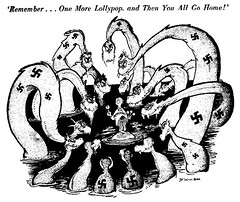Monday, February 20, 2006
Who's Handing Out the Lollipops?
Dr. Helen recently took a realistic psychological look at the ironic inclination to appease those who threaten:
It gets ironicker.
When I think of appeasement, I think of the weak trying to fend off the powerful. Kind of like it appears in the old Dr. Seuss cartoon that's making the rounds:
But in reality, oddly enough, in all these situations the candy is not being handed out by a frightened little guy to toothy, overgrown monsters. It is actually the party with the upper hand distributing the lollipops, feeding and strengthening the aggressive little guy, at least in the beginning. Strange.
Does the cat appease the mouse? Does the bird appease the worm? No. But the cat does not feel guilty for being a cat, nor the bird for eating a worm.
The modern West has lost its ability to wield power with a clear conscience. Just as America has become unable to wear khaki without tripping on Vietnam flashbacks, the West seems unwilling or unable to move beyond a sense of post-colonial guilt. As if cats and birds with any conscience should choose their own starvation. Even stranger, were the West to confidently stand for its own values and its own survival, it would require the death of no worm.
By no means am I advocating the immoral or even amoral exercise of power for its own sake, just because one has it. Nor do I call for the consumption of worms. But if careful introspection fails to turn up any core values that justify the use of power to preserve them, nothing can sustain the remaining hollowed out existence but a diminishing-returns game of appeasement.
When does the appeasement stop? When the appeaser finally finds a set of values worth fighting for -- or when the lollipops run out. Finding those values sooner rather than later keeps the battles simpler, and saves a lot of lollipops.
If cats and birds ever lose faith in the legitimacy of their own existence, turning to appeasement as a morally palliative diet plan, we may find ourselves living in a world run by worms and mice. Sometimes it feels like we might already be there.
If you really, really liked this -- or even really, really hated it -- there's lots more:
She illustrates her point with more than just the well-known historical examples -- I'm explicitly avoiding mention of Hitler because I don't want to run afoul of Godwin's Law before I've even gotten started. Dr. Helen points out the same dynamic is in force when Danes feel threatened by alienated immigrant Muslim populations, or even when welfare applicants bully the very staff on whom they depend.
"If you reward cruelty with kindness, with what do you reward kindness?"
--Hillel
You would think that governments as well as people in general would understand that appeasing and rewarding negative behavior doesn't work. It's basic psychology 101--but one that not even most psychology professors understand or put to use. And apparently, this concept is foreign to many of the politically correct persuasion outside the classroom as well--for them, their feeling of moral "superiority" trumps human nature and causes liberals to turn a blind eye to justice and acts of violence.
It gets ironicker.
When I think of appeasement, I think of the weak trying to fend off the powerful. Kind of like it appears in the old Dr. Seuss cartoon that's making the rounds:
But in reality, oddly enough, in all these situations the candy is not being handed out by a frightened little guy to toothy, overgrown monsters. It is actually the party with the upper hand distributing the lollipops, feeding and strengthening the aggressive little guy, at least in the beginning. Strange.
Does the cat appease the mouse? Does the bird appease the worm? No. But the cat does not feel guilty for being a cat, nor the bird for eating a worm.
The modern West has lost its ability to wield power with a clear conscience. Just as America has become unable to wear khaki without tripping on Vietnam flashbacks, the West seems unwilling or unable to move beyond a sense of post-colonial guilt. As if cats and birds with any conscience should choose their own starvation. Even stranger, were the West to confidently stand for its own values and its own survival, it would require the death of no worm.
By no means am I advocating the immoral or even amoral exercise of power for its own sake, just because one has it. Nor do I call for the consumption of worms. But if careful introspection fails to turn up any core values that justify the use of power to preserve them, nothing can sustain the remaining hollowed out existence but a diminishing-returns game of appeasement.
When does the appeasement stop? When the appeaser finally finds a set of values worth fighting for -- or when the lollipops run out. Finding those values sooner rather than later keeps the battles simpler, and saves a lot of lollipops.
If cats and birds ever lose faith in the legitimacy of their own existence, turning to appeasement as a morally palliative diet plan, we may find ourselves living in a world run by worms and mice. Sometimes it feels like we might already be there.








